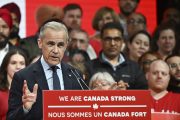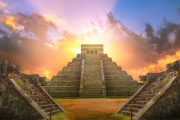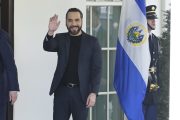
The resolution called on all 192 UN member states not to recognize any government in Honduras other than that of ousted President Jose Manuel Zelaya.
"This resolution is historic," said Zelaya, only hours after he had arrived at UN Headquarters. "It is significant and it will empower every last citizen of this world."
An AP report noted that on the day he was arrested and exiled, Zelaya had "defied the country’s Supreme Court by calling a referendum on constitutional change that opponents worried would lead to a Venezuela-style socialist state." The Honduran constitution allows each president to serve only one four-year term and the referendum sought to measure support for changing that provision.
"I am not going to convene a constitutional assembly, and if I was offered the possibility of remaining in power, I would not do it," Zelaya replied, when he was asked about his quest to change the constitution. "I am going to fulfill my four years. I am going to fight to have the four years respected because it’s part of our law."
Zelaya said that when his term ends on January 27, he would — if reinstated to power — return to his previous life as a rancher. He did not explain why, if he has no intention on staying in office after his term expires, he sought to have the constitution amended to allow another term. Newly installed President Roberto Micheletti has also said he will serve only to January 27, when a replacement elected in this November’s elections would be inaugurated.
Zelaya originally said that he will return to Honduras on July 2, accompanied the Organization of American States Secretary-General Jose Miguel Insulza. However, at the request of the OAS, he said he is delaying his visit for several more days. Honduran authorities have threatened him with arrest if he returns. Enrique Ortez, the nation’s foreign minister, has said: "We have the warrants ready so that he stays in jail in Honduras and is judged according to the country’s laws."
According to the AP, the UN General Assembly has traditionally not often involved itself in its member nations’ internal political matters, but that the current president of the assembly, Miguel D’Escoto Brockmann, a leftist Nicaraguan priest, has frequently broken new ground and addressed political matters usually taken up by the Security Council. D’Escoto, who was born in Los Angeles, is an adherent of "liberation theology," and secretly joined the Sandinistas — the communist guerilla movement that worked to overthrow the conservative Nicaraguan government of Anastasio Somoza Debayle in 1979. The Vatican has twice officially condemned the Marxist and violent characteristics of liberation theology.
Reuters news agency, which interviewed newly installed President Roberto Micheletti in Tegucigalpa, the Honduran capital, said that Micheletti defended the ousting of Zelaya, whom he charged practiced a "Chavismo" brand of socialism patterned after Venezuela’s Marxist President Hugo Chavez — of whom Zelaya has been a strong ally. Micheletti told Reuters that Honduras was "more of a democracy today than it was three days ago."
In an action even stronger than the UN’s, the Organization of American States on July 1 gave Honduras three days to restore Zelaya to the presidency, or face suspension from the hemisphere-wide body. Miguel Insulza, the secretary-general of the OAS, described Zelaya’s removal as an "old-fashioned coup," and said: "We need to show clearly that military coups will not be accepted. We thought we were in an era when military coups were no longer possible in this hemisphere."
Insulza is probably sensitive to the concept of coups, since, as a Chilean socialist, he was once a political adviser to the Chilean Ministry of Foreign Affairs under the regime of the communist Salvador Allende. Allende was removed from power in 1973 by anti-communist General Augusto Pinochet and Chile’s military, as he sought to consolidate the power of Chile’s communist and socialist parties into a leftist dictatorship. Insulza’s political career was interrupted with the demise of the Chilean Socialist Party under Pinochet, and he went into exile in Mexico from 1981 to 1988.
The OAS resolution called the removal of Zelaya by the military at the directive of Honduras’ supreme court and congress an "unconstitutional alteration of the democratic order." The assembled OAS delegates demanded Zelaya’s immediate and safe return to power. The resolution also "condemns vehemently the coup d’état staged against the constitutionally established government of Honduras, and the arbitrary detention and expulsion from the country of the constitutional president, José Manuel Zelaya Rosales."
As for the possible consequences for Honduras if it does not comply with the OAS resolution, the New York Times reported that Jorge Taiana, the foreign minister of Argentina who presided over the 34-nation group’s special general assembly in Washington, said that if the diplomatic approach did not prevail within 72 hours, the OAS would "have to take the decision to suspend Honduras in its rights and duties in this organization."
The presidents of Argentina and Ecuador — in an apparent attempt to shield Zelaya from arrest — have said that they will accompany the exiled leader, along with officials of the OAS and the UN, during his planned return to Honduras. In an interview with the Spanish newspaper El Paìs published on July 1, the newly installed Micheletti said of Zelaya: "If he comes back, he will be arrested. He is facing charges. He has exceeded the constitution and called an illegal referendum."
While expulsion from the OAS might not be serious enough to bend the new Honduran government to the will of the internationalists for whom national sovereignty is but an anachronistic relic of the 19th century, there are more persuasive ways for the one-worlders to bring recalcitrant states into check. An AFP report of July 1 noted: "Financial institutions, including the World Bank and regional banks, have also ordered the suspension of loans and payments to the impoverished nation."
Such a strategy has been used before to bring down independence-minded governments that do not submit to the one-worlders that would have all nations become subservient to the UN, the EU, the OAS, and a host of other would-be regional governments. A typical scenario goes like this: first, the international banks cut off loans and credits necessary to finance the nation’s imports and exports (in Honduras’s case, mostly coffee and bananas). With most international trade brought to a halt, the nation’s economy is thrown into a severe depression and workers lose their source of income. Next, with their families going hungry, the workers become ripe targets for communist agitators fomenting riots against the government. Using arms smuggled into the country by communist agents, armed mobs place the government under strong pressure to step down. Finally, leftists supplied with financing and organizational help from abroad take over the government, creating an oppressive socialist regime much worse than the one driven from power. (The violent replacement of Fulgencio Batista by Fidel Castro in Cuba is a classic example.)
However, the preceding scenario is never called a "coup" by the major media. Coups, you see, are always right-wing, never left-wing.
Photo: AP Images




